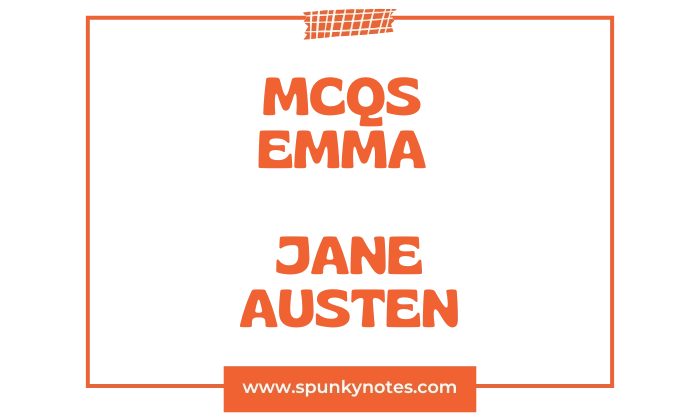

Estimated Reading Time: 17 min
Emma MCQs
1. What three qualities described Emma Woodhouse at the novel’s opening?
A. Rich, vain, and beautiful.
B. Handsome, clever, and rich.
C. Young, well-bred, and witty.
D. Sweet-tempered, witty, and rich.
2. How far was Mrs. Weston’s new home, Randalls, located from Hartfield?
A. One mile
B. Two miles
C. Half a mile
D. A short walk
3. What term described Mr. Woodhouse’s lifelong health habit?
A. Hypochondriac
B. Valetudinarian
C. Ailing gentleman
D. Chronic invalid
4. What activity did Emma introduce to help her father get “tolerably through the evening”?
A. Reading aloud
B. Card games
C. Backgammon
D. Music
5. How far did Mr. Knightley live from Highbury?
A. Half a mile
B. About a mile
C. Three miles
D. At Donwell Abbey
6. How old was Mr. Knightley at the beginning of the novel?
A. Early twenties
B. About fifty
C. Seven or eight and thirty
D. Early sixties
7. How long before the marriage did Emma claim to have made the match between Mr. and Mrs. Weston?
A. One year
B. Four years ago
C. Since she was twelve
D. Six months
8. What act of gallantry confirmed Emma’s plan for the Weston match?
A. Mr. Weston singing
B. Mr. Weston offering money
C. Mr. Weston riding to town
D. Borrowing two umbrellas
9. What did Mr. Knightley argue Emma’s supposed match-making success truly was?
A. Clever manipulation
B. Good intention
C. A lucky guess
D. Interference
10. Who did Emma immediately determine to match-make for next?
A. Mr. Knightley
B. Miss Bates
C. Mr. Elton
D. Harriet Smith
11. What had been Mr. Weston’s military rank in the county militia?
A. Sergeant
B. Colonel
C. Captain
D. Lieutenant
12. The gentleman who married Miss Churchill was expected to visit his father because it was considered what?
A. An indulgence
B. A proper attention
C. A necessary evil
D. A quick duty
13. The Martins of Abbey-Mill Farm rented a large farm from whom?
A. Mr. Weston
B. Mr. Woodhouse
C. Mr. Knightley
D. Mr. Elton
14. What central quality did Emma believe Harriet Smith lacked?
A. Elegance
B. Good manners
C. Penetration
D. Fortune
15. What specific book, besides Agricultural Reports, was Mr. Martin known to read to himself?
A. The Romance of the Forest
B. The Vicar of Wakefield
C. The Children of the Abbey
D. Fordyce’s Sermons
16. What was Mr. Martin’s age?
A. Thirty
B. Twenty-one
C. Four-and-twenty
D. Eighteen
17. When Emma first met Mr. Martin, she judged his entire want of gentility to be comparable to what?
A. His handsome face
B. His rich land
C. His being very clownish
D. His quiet voice
18. What made Emma feel Mr. Elton was a better role model than Mr. Knightley or Mr. Weston?
A. His wealth
B. His decisiveness
C. His sarcastic wit
D. His gentleness/softness
19. Besides his vicarage, Mr. Elton was known to possess what?
A. An estate near London
B. Some independent property
C. A vast library
D. Shares in trade
20. What relationship between Emma and Harriet did Mr. Knightley lament?
A. Emma’s need to teach Harriet
B. Harriet’s delightful inferiority
C. Harriet’s low birth
D. Emma’s excessive reading
21. What did Mrs. Weston call Emma’s eye color?
A. Deep grey
B. Bright blue
C. True hazel eye
D. Sparkling green
22. What object did Emma refuse to finish sketching after her sister criticized it?
A. Her brother, Mr. John Knightley
B. Her father
C. Little Henry
D. Mrs. Weston
23. What did Mr. Martin leave for Harriet, besides songs, which contained his proposal?
A. A box of walnuts
B. A drawing
C. A letter
D. A book
24. What advice did Emma lay down as a general rule regarding accepting a man?
A. Consult friends first.
B. If a woman doubts, she must refuse.
C. Always wait six weeks.
D. Consider his connections carefully.
25. Where did the letter from Frank Churchill state he was writing from?
A. Enscombe
B. Highbury
C. Weymouth
D. London
26. Mr. Woodhouse suggested going to which sea-bathing location instead of South End?
A. Brighton
B. Bath
C. Cromer
D. London
27. Who was Emma’s most intimate and unreserved confidante after Mrs. Weston’s marriage?
A. Harriet Smith
B. Miss Bates
C. Mrs. Weston
D. Her father
28. Mr. Weston told Emma that Frank Churchill would be visiting Highbury within what timeframe?
A. A week
B. A fortnight
C. The next day
D. By Christmas
29. Mr. Weston attributed Frank’s delayed visit to Enscombe to the temper of whom?
A. His uncle
B. Miss Darcy
C. Mrs. Churchill
D. Miss Taylor
30. Who delivered the news to the Randalls party that the ground was covered in snow?
A. Mr. Weston
B. Frank Churchill
C. Emma
D. Mr. John Knightley
31. How did Mr. Elton excuse his attentions to Harriet after Emma realized his error?
A. He was slightly drunk.
B. He only paid attention to Emma’s friend.
C. He was testing her.
D. He was being kind.
32. Mrs. Elton was the youngest of two daughters of a gentleman involved in what line of work?
A. Trade
B. Bristol merchant
C. The military
D. Farming
33. Frank Churchill returned from London after traveling sixteen miles twice over for what minor reason?
A. To buy new gloves
B. To visit a friend
C. To have his hair cut
D. To send a letter
34. Who did Mr. Weston believe would be offended if Mr. Frank Churchill did not call early on Jane Fairfax?
A. Her grandmother
B. Emma
C. Colonel Campbell
D. His father (Mr. Weston)
35. What did Miss Bates reveal Mr. Knightley had given her family after they worried about its shortage?
A. Wine
B. Flour
C. All his store apples
D. A servant
36. What was the solution found for holding the ball, replacing the use of Randalls?
A. Hartfield
B. The Crown Inn
C. Donwell Abbey
D. The church hall
37. Frank Churchill was recalled to Enscombe due to the sudden illness of whom?
A. Mr. Churchill
B. Mrs. Churchill
C. Miss Fairfax
D. Colonel Campbell
38. The charade solution “Courtship” was clearly meant for Harriet, but what word did she suggest as a guess?
A. Woman
B. Empire
C. Shark
D. Love
39. What word did Frank Churchill put before Jane Fairfax during the alphabet game that made her visibly blush and angry?
A. Blunder
B. Dixon
C. Weston
D. Enscombe
40. Mr. Knightley scolded Emma at Box Hill for laughing at Miss Bates, whose situation he said should secure Emma’s what?
A. Respect
B. Compassion
C. Pity
D. Courtesy
41. Jane Fairfax accepted a position as a governess with whose children?
A. Mrs. Weston’s
B. Mrs. Suckling’s
C. Mrs. Smallridge’s
D. Mrs. Goddard’s
42. How did Emma learn that Mr. Knightley already knew about the Frank Churchill/Jane Fairfax engagement?
A. He called at Mrs. Goddard’s.
B. Mrs. Weston told him.
C. He received a brief account from Mr. Weston by post.
D. Jane Fairfax wrote to him.
43. What phrase, concerning his own feeling, did Mr. Weston use when he came to Emma regarding the secret engagement?
A. I am overjoyed.
B. It is horrible news.
C. It concerns only myself.
D. It is a scandal.
44. When Emma learned Harriet’s true attachment was to Mr. Knightley, what sudden realization “darted through her”?
A. She was relieved.
B. She was right about Frank Churchill.
C. Mr. Knightley must marry no one but herself.
D. She must leave Hartfield.
45. Upon reflecting on her past actions, Emma accused herself of “unpardonable” what?
A. Anger
B. Arrogance
C. Ill-breeding
D. Ignorance
46. What conviction made Mr. Knightley decide to ride home immediately from London?
A. Frank Churchill was a fool.
B. Isabella was worried about Emma.
C. The history of Jane Fairfax.
D. Mr. Woodhouse needed him.
47. Mr. Knightley’s plan for marrying Emma while respecting her father’s comfort involved what arrangement?
A. Mr. Woodhouse moving to Donwell
B. Emma moving to London
C. Mr. Knightley being received at Hartfield
D. Moving to Randalls
48. When reading Frank Churchill’s explanation letter, Mr. Knightley commented on the “beauty” of what two traits?
A. Love and devotion
B. Truth and sincerity
C. Politeness and discretion
D. Wealth and good taste
49. What did Mr. Knightley confess about Frank Churchill’s engagement when speaking to Emma?
A. He was jealous of Frank Churchill.
B. He had been jealous of Frank Churchill.
C. He regretted leaving Highbury.
D. He had secretly aided Frank.
50. What news did Mr. Knightley share with Emma that caused her great relief regarding Harriet?
A. Harriet decided to move away.
B. Harriet refused to marry.
C. Robert Martin had proposed and been accepted by Harriet.
D. Harriet was moving to Brunswick Square.
<hr style=”border-top: 1px solid #F16232; margin-top: 27px; margin-bottom: 25px;” />
Brief Overview
Emma is a novel by Jane Austen. It focuses on Emma Woodhouse, a beautiful, clever, and wealthy young woman who lives in a small English village. Because she has money and status, Emma believes she knows what is best for everyone.
The central conflict of the novel is Emma’s major flaw: her conviction that she is an excellent matchmaker. She decides to stop focusing on her own love life and instead arranges marriages for her friends and neighbors. Her first target is her new, sweet, but simple friend, Harriet Smith.
Emma tries to match Harriet with the local vicar, Mr. Elton. This plan fails when Mr. Elton proposes to Emma instead. Her long-time family friend, Mr. Knightley, is the only person who openly criticizes Emma’s arrogance and manipulation.
Emma continues her meddling, especially after two new people arrive in the village: Frank Churchill and Jane Fairfax. She mistakenly encourages Harriet to believe that Frank is in love with her. This causes Harriet great emotional distress and humiliation.
Emma finally begins to realize the serious consequences of her arrogant interference. She understands her own feelings when she mistakenly fears that Mr. Knightley is in love with Harriet.
The novel concludes with Emma recognizing her errors and accepting that she is in love with Mr. Knightley. They marry after Emma learns the valuable lesson of humility and self-knowledge.


